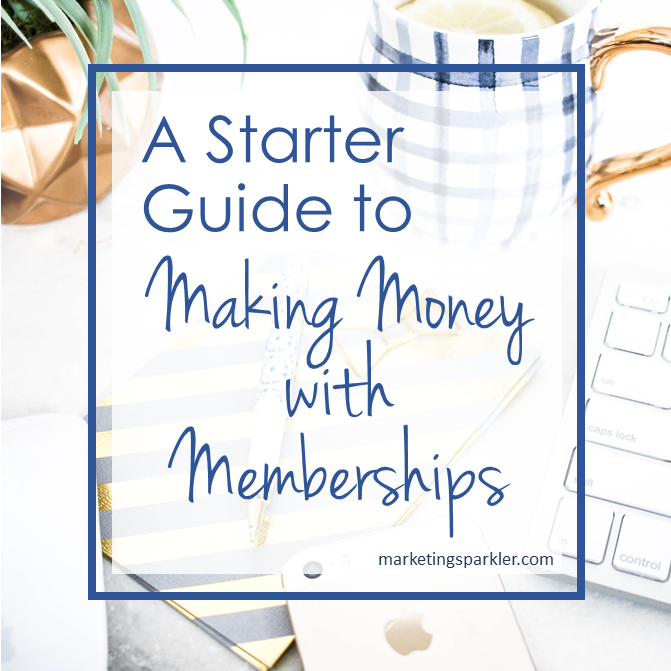Starting a membership site can be lucrative and fun. You get to nurture and support a community while enjoying profits for months or even years to come.
If you’ve used other business models in the past, then you probably know that many models often create a feast or famine cycle. One month your profits may be high and you’re enjoying the good life. However, the very next month, you’re back to struggling just to pay the bills and keep the lights on.
With a membership site, you can accurately guess what your monthly income will look like. This can help prevent the feast and famine cycle of infinite launches and the intense financial stress that can go with it.
Not only do you have a monthly income, you also have a database of customers that are hungry for more of your products or services. That means, you can launch a new offering and share it with a dedicated fan base of people who already know, like, and trust you. Having a loyal fan base allows you to make even more money from each new product launch.
Start A Membership Site: Your Starter Guide to Making Money With Memberships
Many coaches and consultants are turning to membership sites as a way of earning recurring cash. Membership sites can be great for bringing in money month after month, with very little extra work required to maintain them.
Part 1: Getting Your Membership Site Started
Part 2: Types of Memberships and Subscriptions
Part 3: Organizing Your Membership Site
Part 4: Membership Promotion Strategy
Part 5: Membership Communication and Messaging
Part 6: Make Sure Your Membership Site Runs Smoothly
Getting Your Membership Site Started
Let’s start from the beginning. A membership site is a site that’s password protected, and generally requires users to pay a monthly fee. Most membership sites are protected by special scripts that handle the managing of the usernames and passwords of members. They also take care of canceling members whose payments don’t go through, or members who cancel manually.
It is relatively simple to start a membership site. You only need 3 things to get started:
- a membership script, aka membership management software
- a billing provider, and
- content.
The membership script will generally take care of the billing, member management, and protection of the members’ area.
Fortunately, there is an abundance of membership scripts available to fit any budget. From a simple plugin such as s2Member, to a more robust solution like aMember, software options today provide a wide spectrum with all the bells and whistles you can think of. If you’re already using a content management system like WordPress, you can simply password-protect pages on your website without the use of an extra plugin at all.
You can literally set up a full membership site in a couple hours. All you need to do is set up the script, add a billing provider such as PayPal, and add content to the members’ area. How’s that for simplicity?
Types of Memberships and Subscriptions
The first step is to figure out what type of membership/subscription site you want to start. Keep in mind, it may incorporate more than one of these ideas.
Type A: Online Membership Sites
The most common type of content-based membership is an online membership where members have access to certain content, advice, tools, etc.
For example, you can offer a monthly course, digital newsletter, articles, how to information… whatever your members want. Then, you can include downloadable software, offer coaching, provide templates or other tools. The deliverables you design for your membership subscribers is completely up to you.
Create Launch Profit (CLP) is a monthly membership site of marketing templates. This eSubscription Box offers a themed set of templates each month, curated specifically for solopreneurs and small business owners who need someone to write and create marketing system, yet lack the marketing staff (or budget) to hire full-time staff. Launching your membership site will be a breeze when you pickup these “Membership Site” templates from the CLP membership. Shop here for more info.
Type B: Physical Product Subscription
You don’t have to do everything online. There’s something about having a real physical product in one’s hands that appeals to people. It might be content delivered via print newsletter, magazine, CD or DVD. Or it might be a t-shirt of the month, wine of the month, craft project of the month or anything else your members would be interested in.
You could also start a membership site and include a combination of the above. For example, you could give some content online, but provide your members with a physical product to look forward to on a monthly or quarterly basis. Or, if you’re offering a wine of the month club, have your members log in to find recipes, wine pairings and other useful content.
Organizing Your Membership Site
Before you start writing, recording audio or video, decide on the specific topics your membership site is going to cover and how you are going to organize the information.
Here are a few things to consider before you start a membership program:
- Look at what information is included in other similar membership sites. What ideas can you adopt and what can you do to make it better?
- Think about your target market and what their biggest struggles are. How can your product address that?
- How can you help them do it in less time and without as much work?
You may also survey your readers and customers on what they would find helpful. Always keep tabs on what your members want and evolve your membership according to their changing needs.
Membership Promotional Strategy
You’ve planned your membership site. You’ve assigned the content creation. Now it’s time to plan your promotion strategy to get members! Here are a few ideas for the pre-launch, launch and post launch phases, to keep a steady stream of new members coming in.
Promoting the product before launch is a great way to generate a ton of excitement and interest. Depending on the complexity and cost of your membership site, you could start your pre-launch promotions 30-60 days in advance, or more if you feel you can keep the level of excitement up.
Here are a few tips to get you started:
Pre-sales and Emails
- Create an early notification list. Set up an opt-in page where your sales page will eventually be to get those interested in the topic to sign up, so you can notify them when the membership site is ready. Have them sign up to get sneak peeks, be a beta tester or even just receive a discount on the launch price.
- If you have existing customers or access to a large mailing list, consider launching a pre-sales campaign. It can create a lot of early buzz for the product.
- Nurture your list of interested parties that have not yet joined. Share demos, discuss more of the features and how it will solve the problem. Offer a free trial. Ask if they’d like to participate in a group chat to get their questions answered.
So you wanna launch a membership site? Setting up your program will be a breeze when you pickup these “Membership Site” templates, a full soup-to-nuts package covering everything from a membership platform comparisons, to setup and sales processes, planning your members area content, and ongoing messaging to attract and retain members. Shop here for more info.
Content Marketing Ideas
- Blog about it… and blog some more. Find guest blogging opportunities related to the base topic of your membership site and share your wisdom, dropping a small product mention and link to your landing page.
- Email about it. Talk about the issues people face that subscribing to this membership product will solve. Talk about solutions they’ve tried before that didn’t work or not as well as expected.
- Host a live video or pre-record one to share a little about the membership, what it can do and how it will help viewers. Show viewers you understand their problem and help them visualize what life will be like after subscribing to your membership.
- Repurpose content you sent pre-launch into other marketing methods. Turn blog posts into videos, videos into checklists, etc.
Affiliates and Influencers
- Rev up your affiliates. Give them the launch details in plenty of time for them to schedule the promotion into their calendar. Give them pre-written content and images that they can use for promoting the product.
- Advertising: If you have the budget, create some advertising that talks about your brand and the membership product. Talk about the unique features of your membership and how it can change people’s lives or businesses.
- Touch base with influencers and bloggers within your niche. See who you can get on board to promote your product. Offer to write some emails, social media posts and/or blog posts to make it easy for them to promote. Be sure to offer them freebies they can share with their audience.
- Partner up with others to host a Q&A session, webinar or podcast to discuss the product, what it can do for others, how it came about, early results being seen, etc.
Finally, you will want to continue to nurture and build relationships with your buyers. Analyze the stats of all the marketing you’ve done thus far. Once you start a membership site, your work is not done. Repeat what’s working, tweak things that are doing a fair job and dump those that are not performing well.
Membership Communication and Messaging
As you get more members, your monthly income will continue to grow, and you’ll have money coming in each month. You’ll just need to continue delivering whatever it is you promised your members and subscriptions will stay on a steady increase!
If you have a membership website, you probably email your members once a month to deliver their content. But if you want your members to stay subscribed, you should be emailing more often. Frequent messages keep your members engaged with your brand and make it less likely that they’ll suddenly cancel their membership with no warning.
Ideally, you want to email your subscribers once a week. Use this simple schedule to start, and tweak it as you get learn more about your audience response rates.
Week #1: The Delivery Email
This email should contain a link to the new content you have available. Let subscribers know where to login to download their content and provide their username. Then take it a step further and offer them help if they can’t access their content for some reason.
Week #2: The Reminder Email
Some subscribers may have missed your original email or they may not have had a chance to download it on the day of release.
Encourage subscribers to download their content by telling them a little bit about it. For example, if you’re a wellness coach that provides nutritious recipes for families, you could say, “My kids love the applesauce muffin recipe I included this month. They asked me to put these muffins in their back to school lunches.”
Week #3: The Teaser Email
Use this email to tease your subscribers about what’s coming up next. This makes them curious and gives them a reason to stay subscribed. This doesn’t have to a long email and you shouldn’t include everything that you’ll be giving them next month.
It can be a simple message but it gives you a reason to stay in contact and keeps your brand fresh in your subscribers’ minds.
Week #4: The Expiration Email
If you do not have a content vault, and you swap content on a monthly basis, this is your chance to remind your subscribers that the current month’s content is going to expire soon. Urge them to download it while there’s still time.
Make it Personal
Try to be personal in every email you send to your subscribers. Let them know what’s going in your life or business. You could say, “Happy September! I really enjoyed this summer. But the kids are back at school again so I’m gearing up to set my autumn business goals.”
You want to weave in these details because it makes your connection with your subscribers even stronger. Plus, it gives you a chance to tell them about other neat stuff you may have going on.
Keeping your subscribers engaged with your content is one way to go above and beyond with your customer service. Little touches like consistent emails will make your brand memorable to your subscribers.
Make Sure Your Membership Site Runs Smoothly
When you decide to start a membership site, it’s easy to let your enthusiasm take over. However, before you launch, you’ll want to consider implementing three key practices to make sure your membership runs smoothly.
First, listen to your members. If they are providing feedback, do not be afraid to shake things up.
Second, do not get caught up with the technical aspects of running the membership. It’s perfectly fine to start with a bare bones version of your membership. Later when you’ve experienced some success and have a base of core users, you can go through and add those fancy extras.
Third, launching a membership will require a lot of marketing and promotion. Ideally, you want content ready 3-6 months in advance. This ensures your members get a steady supply of content while you’re adjusting to the responsibilities of running a membership.
So you wanna launch a membership site? Setting up your program will be a breeze when you pickup these “Membership Site” templates, a full soup-to-nuts package covering everything from a membership platform comparisons, to setup and sales processes, planning your members area content, and ongoing messaging to attract and retain members. Shop here for more info.
In Conclusion
Grow your offerings as you get more feedback and your income allows to add more content, tools or other valuable resources for your members. This makes your members want to stay for the value you’ve added.
You don’t have to be a guru or an industry name to launch your own successful membership site. With this information along with this tools in the Membership Site Templates Package, you can do it right now and start enjoying the rewards of recurring income.
Ciao,
Miss Kemya








